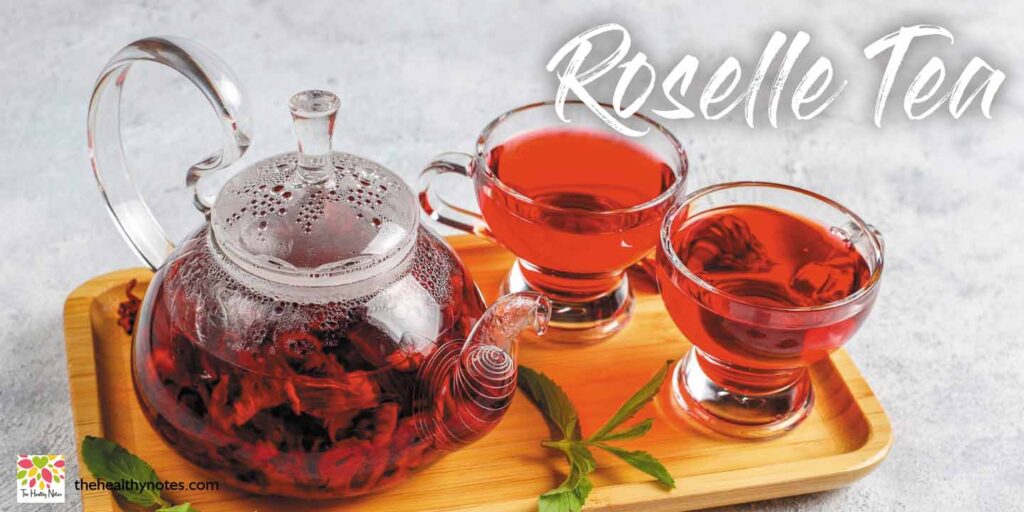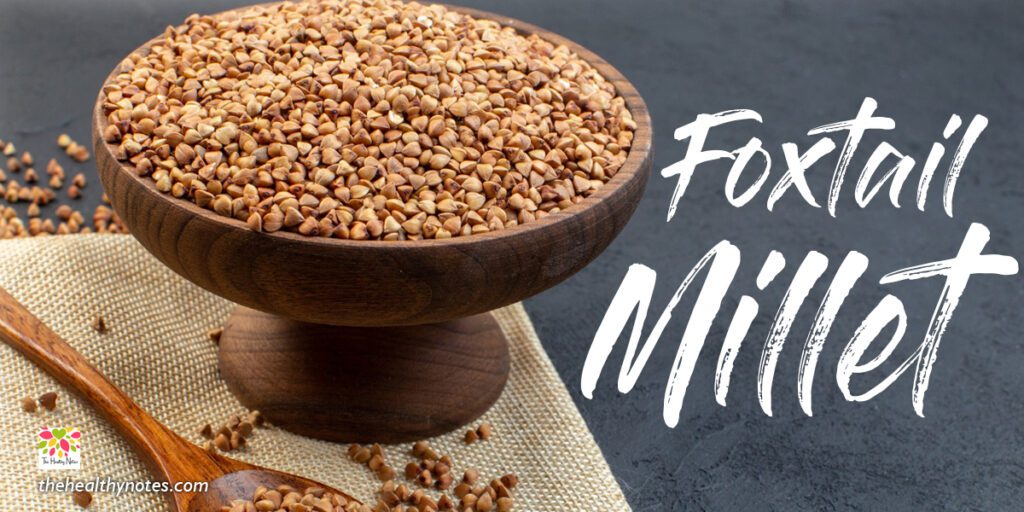
Before talking about Roselle tea health benefits and recipe, first, let us know about Roselle tea.
Roselle tea, also known as hibiscus tea, is a popular herbal beverage made from the dried calyces (the outer layer of the flower) of the Hibiscus sabdariffa plant, commonly known as the roselle plant or hibiscus plant.
This tea has a vibrant, ruby-red color and a tart, refreshing flavor. It is often described as tangy and slightly sour, with fruity and floral notes.
It is rich in antioxidants, particularly anthocyanins, which are known for their ability to combat free radicals in the body.
This tea is low in calories and naturally caffeine-free. It is a good source of vitamin C, minerals like calcium and iron, and dietary fiber.
Aside from being enjoyed as a beverage, this tea can be used in various culinary applications.
It can be used to make jams, jellies, syrups, and as an ingredient in salads and sauces.
It is consumed in many parts of the world and holds cultural significance in various countries.
It is commonly used in traditional herbal medicine practices and as a base for herbal teas and beverages.
There are different varieties of hibiscus plants, and the flavor and color of this tea can vary depending on the specific variety used.
12 Roselle tea Health Benefits
Roselle tea, also known as hibiscus tea, is renowned for its potential health benefits.
Here are some of the key health advantages associated with consuming it:

1. Rich in Antioxidants: It is loaded with antioxidants, particularly anthocyanins and quercetin, which help combat harmful free radicals in the body.
These antioxidants may contribute to reducing oxidative stress and preventing cellular damage.
2. Lowers Blood Pressure: Several studies suggest that regularly drinking roselle tea can have a positive impact on blood pressure.
It may help lower both systolic and diastolic blood pressure, potentially reducing the risk of hypertension.
3. Heart Health: The compounds in roselle tea may support heart health by reducing cholesterol levels, especially LDL (bad) cholesterol.
Lowering cholesterol can help reduce the risk of heart disease and atherosclerosis.
4. Weight Management: This tea is often included in weight management plans due to its diuretic properties and potential to inhibit the absorption of dietary carbohydrates.
It can aid in controlling body weight and may be beneficial for those looking to shed a few pounds.
5. Rich in Vitamin C: This tea is a good source of vitamin C, an essential nutrient known for its role in strengthening the immune system, promoting healthy skin, and aiding in wound healing.
6. Digestive Health: This tea has mild laxative properties and can promote healthy digestion.
It may help alleviate constipation and improve overall digestive function.
7. Kidney Health: Some research suggests that roselle tea may have a protective effect on the kidneys by reducing the risk of kidney stones and improving overall kidney function.
8. Liver Health: The antioxidants in roselle tea may support liver health by reducing oxidative stress and promoting the detoxification process.
9. Anti-Inflammatory: It’s anti-inflammatory properties may help reduce inflammation in the body, which is linked to various chronic diseases.
10. Antibacterial Properties: Some studies have shown that roselle tea possesses antibacterial properties, which may help combat bacterial infections.
11. Diabetes Management: It may aid in managing diabetes by helping to regulate blood sugar levels.
12. Hormone Regulation: In traditional medicine, roselle tea is sometimes used to help regulate hormonal imbalances and alleviate symptoms associated with menstruation and menopause.
Important Note: Roselle tea recipe
It’s important to note that while roselle tea offers these potential health benefits, individual responses may vary.
Additionally, if you have specific health conditions or are taking medications, it’s advisable to consult with a healthcare professional before incorporating roselle tea into your daily routine.
Moderation is key, as excessive consumption of this tea may lead to certain side effects for some individuals.

Roselle Tea Recipe (Hibiscus Tea)
Course: Beverage
Cuisine: Caribbean, Indian
Difficulty: Easy
Servings: 2 servings
Prep Time: 5 minutes
Cooking Time: 10 minute
Ingredients:
2 cups of water
1/4 cup of dried roselle tea
2 tablespoons of sugar or honey
2 lemon wedges
Directions:
Begin by taking 2 cups of water in a saucepan or tea kettle, and bring it to a gentle boil.
Once the water reaches a rolling boil, carefully add the dried roselle (hibiscus) tea to the pot. Cover the pot with a lid.
Turn off the heat and allow the tea to steep for approximately 10 minutes. This time allows the flavors to infuse and develop fully.
After the steeping period, introduce your chosen sweetener, whether it’s honey or sugar, into the tea.
Finally, for a refreshing twist, squeeze a lemon wedge into each serving of the tea.
The zesty touch of lemon adds a delightful dimension to your homemade hibiscus tea.

Roselle Tea Side Effects
1. Low Blood Pressure: If you already have low blood pressure or are taking medications that lower blood pressure, consult with a healthcare professional before consuming roselle tea regularly.
2. Gastrointestinal Distress: Some individuals may experience stomach discomfort, cramps, or digestive issues when consuming roselle tea, particularly in large quantities.
If you have a sensitive stomach, it’s advisable to moderate your intake.
3. Potential Diuretic Effect: It can act as a mild diuretic, which means it may increase urination.
While this can help with fluid balance in some cases, excessive diuresis can lead to dehydration.
Ensure you drink enough water to stay hydrated, especially if you consume roselle tea regularly.
4. Oxalate Content: It contains oxalates, which can contribute to the formation of kidney stones in susceptible individuals.
If you have a history of kidney stones or are at risk, it’s wise to moderate your roselle tea consumption.
Roselle tea Health Benefits and Recipe: FAQs
-
Can roselle tea help with weight loss?
Some studies suggest that It may assist with weight management by promoting fat metabolism and reducing appetite. However, it should be part of a balanced diet and not viewed as a standalone weight loss solution.
-
Are there any potential side effects of roselle tea?
Yes, there can be side effects, such as low blood pressure in excessive consumption, gastrointestinal discomfort, and interactions with certain medications. It’s important to consume roselle tea in moderation.
-
Is roselle tea the same as hibiscus tea?
Yes, roselle tea is often referred to as hibiscus tea because it is made from the Hibiscus sabdariffa plant. The terms “roselle tea” and “hibiscus tea” are used interchangeably.
-
How is roselle tea traditionally used in different cultures?
It has cultural significance in various regions. It is used in traditional herbal medicine practices and is also incorporated into culinary dishes, jams, jellies, and sauces in some cuisines.
-
Can I sweeten roselle tea, and if so, with what?
Yes, you can sweeten roselle tea to taste. Common sweeteners include honey, sugar, or even agave syrup.
-
Is roselle tea caffeine-free?
Yes, it is naturally caffeine-free, making it a suitable choice for those who want to avoid caffeine.


3 thoughts on “12 Roselle tea Health Benefits and recipe”